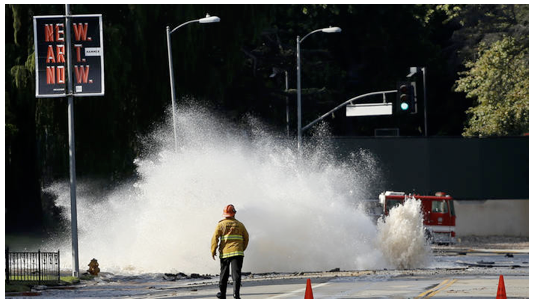CommentsUTILITY OVERHAUL-The Los Angeles City Council is preparing to vote on new water and power rate ordinances that will raise DWP rates annually for the next five years. If Mayor Eric Garcetti signs the ordinances, they will start jacking up your bills within months.
The city has received over 2,000 angry letters of protest about the rate hikes. That may be why Council Member Felipe Fuentes introduced a motion for DWP governance reform to be put on the ballot later this year.
The DWP is governed by a five-member board of commissioners, but the utility is really a department of the city, controlled by the mayor. The commissioners are appointed by the mayor and may be removed at any time. The mayor even controls the board’s agenda.
Over the last 15 years, study after study has concluded that the DWP’s governance structure is a problem. There are too many layers of political control, which prevents efficient decision making and saddles ratepayers with the costs of pet projects, as well as over $250 million per year for general city expenses. DWP salaries are significantly higher than the salaries of L.A. city workers in comparable jobs, and more than double the average salary for comparable jobs nationwide.
Real governance reform would redefine the roles of the board, the general manager and city officials. It would create clear lines of authority and accountability, and it would prevent the kind of political influence or micro-managing that interferes with day-to-day operations.
Instead, city officials have proposed replacing the volunteer board of commissioners with a full-time, salaried board. The mayor also called for more predictable rate adjustments and an overhaul of hiring and contracting practices. Garcetti said he looks forward to a “thorough public discussion” with “stakeholders across the city,” led by Council President Herb J. Wesson Jr.
Wesson sent a letter to the city’s 96 Neighborhood Councils on February 19.
“Dear Neighborhood Council Leaders,” he wrote. “Today marks the beginning of an open and public conversation about making the city’s utility run more efficiently and effectively while ensuring accountability.”
Wesson asks the council leaders to “agendize this item for discussion and action” at their March and April meetings. “This is your time to shine and show the city and its residents the importance and value you bring to city government,” he wrote.
That’s not the way other cities have reformed their utilities.
In 2012, people in Austin, Texas, had some of the same problems with their city-owned utility that L.A. residents have with the DWP.
Rates were going up. Austin Energy had just spent $80 million on a new billing system which was riddled with problems. And the city required the utility to transfer $155 million a year of the money collected from ratepayers to cover general government expenses.
Austin set up a commission to figure out how to make Austin Energy run more efficiently. The commission reviewed research papers on the governance of municipal utilities around the country, studies by the University of Florida, Price Waterhouse, Navigant, the American Public Power Association and the RAND Corporation, and comparisons of utility governance in San Antonio, Denver and Jacksonville.
Sacramento is another city that reformed the governance of its municipal utility. In 2002, the board of directors of the Sacramento Municipal Utility District (SMUD) brought in John Carver, an Atlanta-based expert on nonprofit governing boards. Carver gave the board a presentation of a model he calls Policy Governance, which is designed to make a board effective by balancing independence and accountability.
Ultimately the SMUD board brought in another specialist in governance reform, Leading Resources Inc., to create customized policies for improved efficiency.
Between 2006 and 2011, SMUD’s electricity rates went up by 3.78 percent per year, while LADWP rates rose at an annual rate of 5.67 percent.
Colorado Springs reformed the governance of its public utility in 2011 with a wide-ranging study of reports from consultants and citizen commissions going back to 1993. Researchers looked closely at the city charter, the rate-setting authority, the governance of similar utilities, alternative governance structures, and factors affecting credit and interest rates.
But Los Angeles will reform DWP governance simply by adding it to the agenda of the Neighborhood Councils and discussing it at the March and April meetings.
That’s not how you reform the governance of the nation’s largest municipal utility if you’re serious.
That’s how you do it if you’re trying to fake seriousness just long enough to get a five-year rate increase passed.
(Susan Shelley is an author, former television associate producer and twice a Republican candidate for the California Assembly. This piece first appeared in FoxandHoundsDaily.) Prepped for CityWatch by Linda Abrams.
















